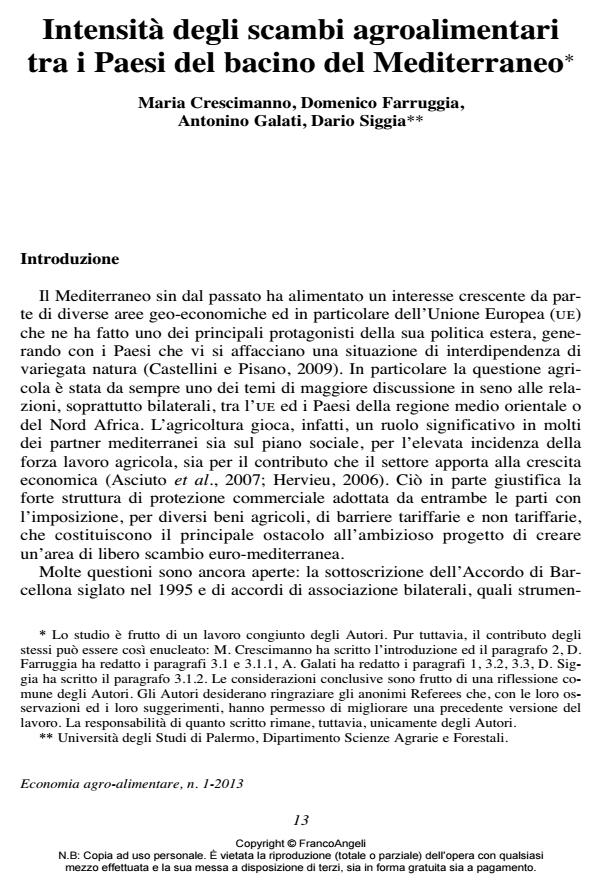Intensità degli scambi agroalimentari tra i Paesi del bacino del Mediterraneo
Titolo Rivista ECONOMIA AGRO-ALIMENTARE
Autori/Curatori Maria Crescimanno, Domenico Farruggia, Antonino Galati, Dario Siggia
Anno di pubblicazione 2013 Fascicolo 2013/1
Lingua Italiano Numero pagine 23 P. 13-35 Dimensione file 1824 KB
DOI 10.3280/ECAG2013-001002
Il DOI è il codice a barre della proprietà intellettuale: per saperne di più
clicca qui
Qui sotto puoi vedere in anteprima la prima pagina di questo articolo.
Se questo articolo ti interessa, lo puoi acquistare (e scaricare in formato pdf) seguendo le facili indicazioni per acquistare il download credit. Acquista Download Credits per scaricare questo Articolo in formato PDF

FrancoAngeli è membro della Publishers International Linking Association, Inc (PILA), associazione indipendente e non profit per facilitare (attraverso i servizi tecnologici implementati da CrossRef.org) l’accesso degli studiosi ai contenuti digitali nelle pubblicazioni professionali e scientifiche.
The Mediterranean has always been an area of strategic interest for the European Union (eu), which, since its establishment, has woven a compact network of relationships with its trading partners in the South and East of the Mediterranean, signing cooperation and then associative agreements with them. This study aims to present a view of how the agro-food trade network has evolved between the eu’s Mediterranean partner countries and their neighbors in North Africa and the Near East. To measure the extent of this trade specific indicators are used which are also widely used in economic literature, albeit to analyze trade in sectors unconnected to agro-food. In particular, analyses carried out by applying bilateral trade indices, according to Frankel and Rose (1997) and Traistaru (2004), showed, on the whole, a progressive weakening in the amount of agro-food trade in the period 1996-2010. An analysis of the intensity indices for bilateral trade between partners in the area helped to identify the main factors that regulate commercial relationships. These are especially historical and excolonial relationships, as in the case of France, or else connected with geographical proximity, which results in border trade. Conversely, the Association Agreements and the Stabilization and Association Agreement signed between the EU on the one hand and its Mediterranean partners on the other, have played a only a marginal role in almost all trade in food products, showing that there is no relationship between the positive trend in the amount of trade and the signing and operation of such agreements.
Parole chiave:Trade Intensity, Agro-food products, Mediterranean countries, Euro-Med Polic
Jel codes:Q170, F140
- STAKEHOLDER PERCEPTION OF EU FOOD SAFETY GOVERNANCE: THE CASE OF EU FRUIT AND VEGETABLE IMPORTS FROM SOUTHERN MEDITERRANEAN COUNTRIES Luca Camanzi, Giulio Malorgio, Abdelhakim Hammoudi, in New Medit /2019
DOI: 10.30682/nm1904b - What are the effects of sea warming on the fishing industry? Antonio Tulone, Antonino Galatia, Salvatore Lupo, Salvatore Tinervia, Maria Crescimanno, in ECONOMIA AGRO-ALIMENTARE 2/2019 pp.217
DOI: 10.3280/ECAG2019-002003
Maria Crescimanno, Domenico Farruggia, Antonino Galati, Dario Siggia, Intensità degli scambi agroalimentari tra i Paesi del bacino del Mediterraneo in "ECONOMIA AGRO-ALIMENTARE" 1/2013, pp 13-35, DOI: 10.3280/ECAG2013-001002